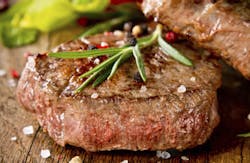As a result of the economy, consumers have scaled back the quality and quantity of meat purchased, while adverse health effects associated with red meat consumption have driven some consumers toward alternative protein sources, according to a new report from industry research firm IBISWorld.
While per capita meat consumption is expected to fall only marginally during the five years to 2013, the recession has exacerbated consumption declines as consumers have scaled back the quality and quantity of meat purchased due to reduced disposable incomes and low sentiment toward the economy in general. Also, adverse health effects associated with red meat consumption have driven some consumers toward alternative protein sources.
In addition to broad trends related to consumer preference and disposable income, disease outbreaks have limited industry growth in specific years. In 2009, swine flu briefly put the domestic pork market on ice despite the fact that cooked pork products were deemed safe to eat. The scare added to already low consumer sentiment and pushed pork volumes down that year.
RELATED: US beef shipments blocked in South Korea
According to IBISWorld Industry Analyst Antal Neville, “Despite these detriments, meat remains a staple product, and greater economic issues do not largely affect overall meat sales.”
Consequently, during the five years to 2013, revenue for the meat, beef and poultry processing industry is expected to grow. Moreover, key downstream markets like in frozen foods and animal food production have also exhibited growth over the past five years, leading to demand for meat products. Meanwhile, competition from substitute seafood products has been minimal, thanks to seafood's comparative high prices and consumers' reluctance to spend on relatively extravagant meals. Consumers' returning purchasing power is expected to bolster industry revenue.
